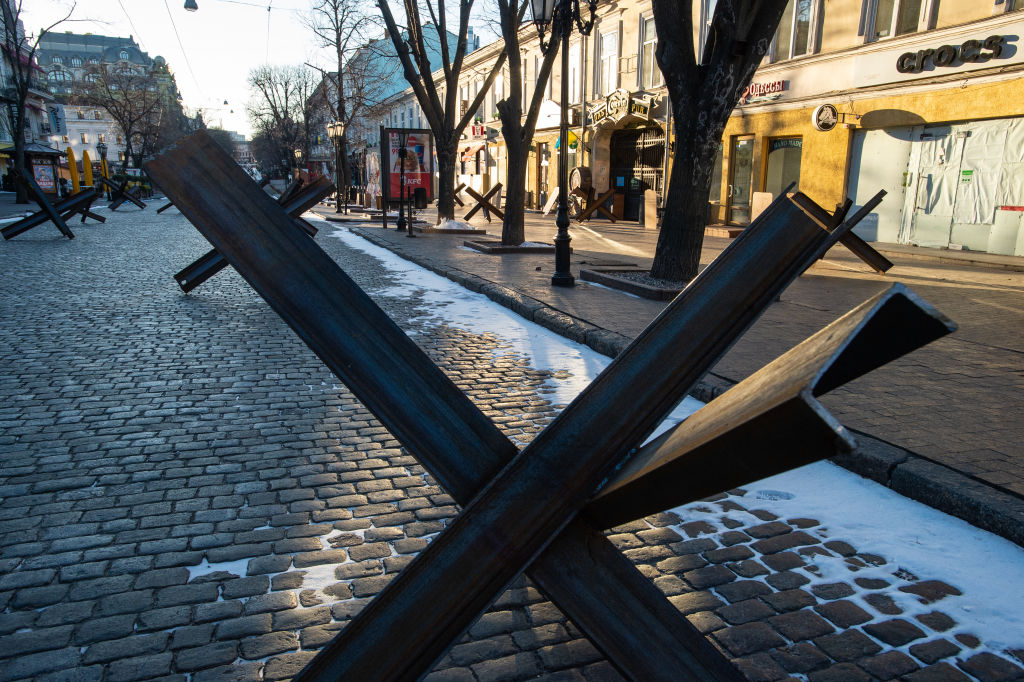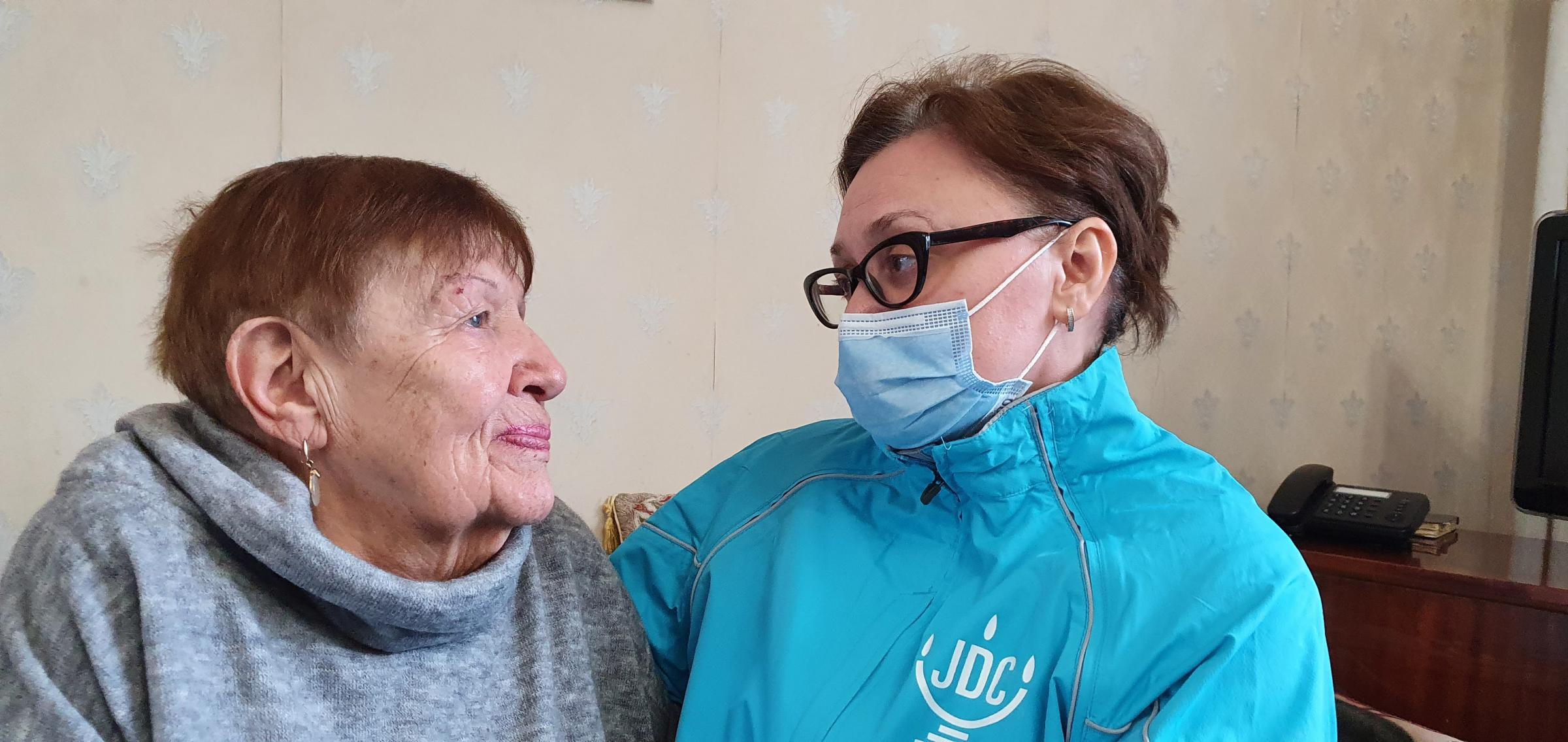
In late February, four days after Russia invaded Ukraine, Inna Vdovichenko, a staffer in the Odessa office of the Jewish humanitarian organization JDC, was sitting in Natalia Berezhnaya’s home when an air raid alert began. Sirens blared. For Vdovichenko, who had come over to keep Berezhnaya company and to see if she needed food or medications, it was the second time she’d heard such sirens; the noise brought with it a wave of fear. But for Berezhnaya, 88, a Holocaust survivor, there was also a feeling of déjà vu.
“She said, ‘I was a little girl when I had to go to the basement and hide from the bombings over Odessa in 1941, and I can’t imagine going there again,'” Vdovichenko, recalls by Zoom.
Berezhnaya had a home care worker, provided by JDC’s network, by her side, and the two made tea and served chocolates and sang to pass the time and lift the mood until Vdovichenko felt safe to leave.
“These people have to go through the war for the second time in their lives,” Vdovichenko says of the Holocaust survivors she has been monitoring as Ukraine has been rocked by war over the last few weeks. “They are afraid of being left without food, without electricity, without water and [of being] alone, that’s what they fear.”

When Nazi Germans invaded Ukraine in June 1941, the country then boasted Europe’s largest Jewish population, according to the United States Holocaust Memorial Museum. Scholars estimate that about 1.5 million Ukrainian Jews were killed, by Nazis as well as by collaborators, during the Holocaust. When Nazis shot to death more than 33,000 Jews at a ravine called Babyn Yar in Kyiv on Sept. 29-30, 1941, it was one of the largest mass shootings of World War II. (Ukraine’s President Volodymyr Zelensky is Jewish; his family lost relatives in the Holocaust, and his grandfather served in the Soviet Army, fighting the Nazis.)
Read more: Is Ukraine’s New Holocaust Memorial Also an Instrument of Kremlin Propaganda?
Berezhnaya is one of Ukraine’s 10,000 Holocaust survivors. Check-ins like the one provided by Vdovichenko have become a vital lifeline for some of the country’s most vulnerable citizens: Among that group, 6,500 are receiving home care and 588 are in the “most disabled” category, according to the Conference on Jewish Material Claims Against Germany (Claims Conference), which provides compensation to Holocaust survivors and funds humanitarian relief organizations in Ukraine. Already there have been casualties as well. On March 18, Borys Romanchenko, a 96-year-old survivor of Buchenwald concentration camp, was killed when Russians bombed his apartment building in Kharkiv. “Survived Hitler, murdered by Putin,” Ukraine’s Minister of Foreign Affairs Dmytro Kuleba tweeted.
Greg Schneider, executive vice president of the Claims Conference, says the imminent danger facing those thousands is forcing his organization to revisit what it means to provide aid to Holocaust survivors.
“Generally, survivors are living in the United States and Israel, in Canada and Australia, in places that are stable,” he says. “[The war in Ukraine] has forced us to do things that we’ve never done in our past, like sourcing pallets of wholesale food, renting trucks, bringing them in across borders. That’s not something we normally do; we’re normally funders.”
Read more: Many Holocaust Survivors Are Struggling Amid the Pandemic. Here’s How Virtual Gatherings Are Helping
The Claims Conference has helped coordinate advances for concentration-camp survivors in Ukraine on the payments they receive as indemnification from Germany, and has so far assisted with hundreds of evacuations for Holocaust survivors to Israel, Poland, Moldova, and Germany. Meanwhile, the JDC set up two emergency hotlines staffed by Israelis who speak Russian and Ukrainian to facilitate evacuation inquiries and coordinate household-supply deliveries.
“Most of them do not want to leave, they’re not requesting evacuation,” says Deborah Joselow, chief planning officer for UJA, another organization that funds social services for survivors. “They said they lived through a war, and they would rather die in their own beds.”
Survivor Mitzvah Project, a nonprofit that has been working with Eastern European survivors since 2001, has helped 348 survivors across Ukraine, helping to coordinate deliveries of food, medical supplies, and firewood. Volunteers have reported Holocaust survivors taking refuge in bomb shelters and living in areas where pharmacies are closed and where they don’t feel safe going out to get food.
“We call them all of the time, and we call new ones every day to check on them and see how they’re doing,” says Zane Buzby, founder of the Los Angeles-based Survivor Mitzvah Project. “That’s a very important thing for them, to know they’re not alone and forgotten.”
Read more: ‘We Weren’t Prepared for This.’ Inside the Accidental Liberation of a Concentration Camp
In the U.S., social-services organizations have found that Holocaust survivors in their communities need special attention at this time as well. Staffers report that Holocaust survivors in general—especially those born in Ukraine—are finding news coverage of the war traumatizing.
“Survivors are reporting to us that they cannot sleep at night as the current war is bringing up severe trauma and triggering PTSD from their wartime experiences,” says Masha Pearl, executive director of The Blue Card, which provides food and financial assistance to Holocaust survivors on or below the poverty line. “They are terrified as they watch the news and are reminded of being sheltered from bombings. They are hounded by the painful memories of cold and starvation.”
In the Chicago suburb of Buffalo Grove, Khana Stolyar, 85, who lived in the Mogilev Podolskiy ghetto in western Ukraine during World War II, worries about relatives who have been living in Ukraine; her brother fled to Moldova after his house was bombed, and she talks to cousins on the phone who tell her they don’t have enough to eat. “When I hear of friends and family that are hungry,” Stolyar tells TIME through Maya Gumirov, who translated and works at CJE SeniorLife, which serves Holocaust survivors in the Chicago area, “it reminds me of being hungry during the war, and I’m heartbroken. It’s very scary.”
In Manhattan, Sami Steigmann, 82, who was born in what’s now the southwestern Ukrainian city of Chernivtsi and survived a labor camp, fears that World War III has already begun. He is afraid of “how far Putin is willing to go,” he says. “That really scares me.”
More Must-Reads from TIME
- Cybersecurity Experts Are Sounding the Alarm on DOGE
- Meet the 2025 Women of the Year
- The Harsh Truth About Disability Inclusion
- Why Do More Young Adults Have Cancer?
- Colman Domingo Leads With Radical Love
- How to Get Better at Doing Things Alone
- Michelle Zauner Stares Down the Darkness
Write to Olivia B. Waxman at olivia.waxman@time.com